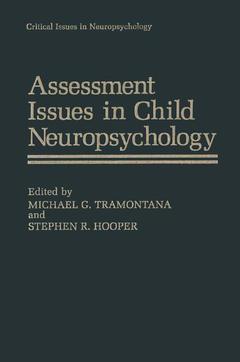Description
Assessment Issues in Child Neuropsychology, Softcover reprint of the original 1st ed. 1988
Critical Issues in Neuropsychology Series
Coordinators: Tramontana Michael G., Hooper Stephen R.
Language: English
Subject for Assessment Issues in Child Neuropsychology:
Keywords
assessment; attention; diagnosis; intervention; neurology; neuropsychology; psychology; rehabilitation
Publication date: 05-2013
384 p. · 15.2x22.9 cm · Paperback
384 p. · 15.2x22.9 cm · Paperback
Description
/li>Contents
/li>
Neuropsychology has its roots in clinical neurology. Reading case de scriptions by 19th century neurologists, such as Wernicke's painstakingly detailed examinations of patients with the "aphasic symptom-complex," makes it obvious that neuropsychology is not a new discipline. Even the marriage with psychology is not new; the neurologist Arnold Pick, for example, was fully conversant with the developments in contemporary psychological as well as linguistic research. However, the primary focus of 19th and early 20th century psychology was on "general psychology," and only a small number of psychologists ventured into what then was called "differential psychology" (the psychology of individual dif ferences) including a few who became attached to neurological research and rehabilitation units after World War I. It remained until World War II for psychologists to establish a more solid working relationship with neurology. What psychology had to offer to neurology was its experimental skill, the development of a sophisticated methodology, and, for clinical work, the development of psychometrics. On the whole, the marriage between the two disciplines has been fruitful, leading to new insights, models, and discoveries about brain-behavior relationships, documented in several textbooks which appeared in rapid succession since the 1960s. In clinical practice, neuropsychology has been inventive in some respects, in others merely introducing psychometric rigor to already existing neurological examinations. As described in greater detail in this book, developmental neuropsy chology is of even more recent origin.
I: Introduction.- 1 Child Neuropsychological Assessment: Overview of Current Status.- II: General Issues in Child Neuropsychological Assessment.- 2 Neuropsychology of the Developing Brain: Implications for Neuropsychological Assessment.- 3 The Role of Neuropsychological Assessment in Relation to Other Types of Assessment with Children.- 4 Neuropsychological Diagnosis with Children: Actuarial and Clinical Models.- 5 From Assessment to Treatment: Linkage to Interventions with Children.- III: Special Topics in Assessment.- 6 Attention.- 7 Clinical Assessment of Memory in Children: A Developmental Framework for Practice.- 8 Assessing Functional Laterality.- 9 Infant and Early Childhood Assessment.- 10 Questions of Developmental Neurolinguistic Assessment.- 11 Learning Disabilities Subtypes: Perspectives and Methodological Issues in Clinical Assessment.- 12 The Prediction of Learning Disabilities in the Preschool Child: A Neuropsychological Perspective.- 13 Electrophysiological Assessment in Learning Disabilities.- IV: Comment.- 14 Problems and Prospects in Child Neuropsychological Assessment.
© 2024 LAVOISIER S.A.S.
These books may interest you

A History of Neuropsychology 140.04 €



